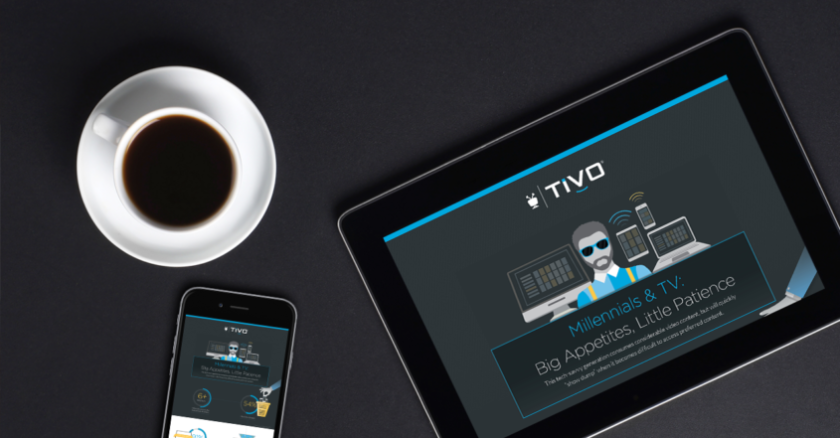M+E Connections

TiVo CEO: Samsung Licensing Deal Provided a Lift in Q4
Story Highlights
The wide-ranging intellectual property licensing deal that TiVo recently signed with Samsung Electronics gave TiVo a revenue boost in the fourth quarter (ended Dec. 31), according to the company.
TiVo shares were up more than 12% at $21.40 in afternoon trading Feb. 16, after the company reported that revenue soared 69% from the fourth quarter a year earlier, to $252.3 million. The sales surge also came on the heels of Rovi buying TiVo for $1.1 billion and adopting the TiVo brand name in 2016. The integration of TiVo into the company’s operations contributed $125.8 million in revenue during the fourth quarter, it said.
The company remains “on track to achieve over $100 million in annual cost synergies” as a result of the TiVo integration, and “we exceeded our synergy targets in Q4,” TiVo CEO Thomas Carson said on an earnings call Feb. 15. TiVo is now “on track to achieve at least” 65% of its “total synergy expectations with actions taken” by September 2017, he told analysts.
The deal that TiVo signed with Samsung put an end to a patent dispute between the companies and provided rights under TiVo’s patent portfolios for Samsung mobile, consumer electronics and set-top box businesses, TiVo said in November.
TiVo’s fourth-quarter achievements also included a product partnership with Netflix that Carson noted on the call allows his company to continue integrating Netflix into TiVo set-top boxes while “broadening” the relationship between the companies. He added: “We believe our customers will benefit from the integrated offering which includes unified search results across the entire content catalog.”
In the third quarter, TiVo announced the “next generation of TiVo user experience” that he said “enables consumers to find content more quickly and with less effort from a diverse array of sources.” A “large international service provider will deploy this next-generation TiVo user experience in early 2017,” he told analysts, without naming that provider.
TiVo ended the year with “tens of millions” of consumers using its discovery products globally and about 23 million household now use its TV discovery experiences in all, he said. Within that footprint, he said, TiVo service households grew 15% in 2016 to more than 6 million. He said 30 million household now use TiVo’s advanced search and recommendations software. TiVo also has more than 500 customers using its metadata in discovery applications on set-top boxes, mobile devices and web sites, he said.
The company, meanwhile, “made significant progress” with its analytics business in the fourth quarter, including the expansion of its agreement with “one of the largest network families” in the U.S., he said. TiVo is now “exploring new opportunities in other segments including pilot projects” with ad agencies and brand advertisers,” he said, not naming them.
During 2017, TiVo’s product business will “focus on harmonizing the legacy TiVo and Rovi product lines and integrating our leading natural language interface into our advanced search and recommendation solution,” he told analysts. It will also concentrate on transitioning existing legacy Rovi guide customers to the “richer and more robust, as well as higher” average revenue per user TiVo user experience, he said.
Carson identified a few “near and long-term product growth drivers” that included selling TiVo products “more aggressively” internationally, “driving metadata sales in traditional and adjacent markets” in the U.S. and in Europe, while continuing expansion in Asia and Latin America, expanding its advanced search and recommendation products, integrating its natural language software to “deliver personalized conversations services and capitalizing on our unique position with our user experience data and metrics to provide advanced analytics products and actionable viewing data.”
TiVo sees “significant opportunities” to sign licensing deals with international pay-TV providers and Chinese CE manufacturers, he said.
The company now has “every major U.S. pay-TV provider except Comcast under license,” he went on to tell analysts. TiVo and Comcast have been engaged in a patent infringement battle. A hearing in TiVo’s ITC case was completed in December and he expects an initial determination in late April, he said, adding: “While we would prefer a commercial agreement and remain open to discussions on that front, we are prepared to continue enforcing our rights through litigation.”
On a long-term basis, TiVo expects to see “additional cost improvements” and revenue growth in 2018 as “we penetrate new licensing opportunities, go-to-market with our integrated best-of-breed solutions, and achieve the remainder of our target synergies,” he said.
TiVo’s fourth-quarter results “came in well ahead of expectations,” B. Riley analyst Eric Wold said in a research note, pointing out it was the first full quarter following the Rovi-TiVo merger. He added: “Although the Q4 upside benefited from Samsung catch-up payments and the inclusion of legacy TiVo hardware revenues, we came away from the results and initial 2017 outlook with a more optimistic stance on the improved post-merger cost structure” of the company and the “strong license pipeline heading into 2017.”









